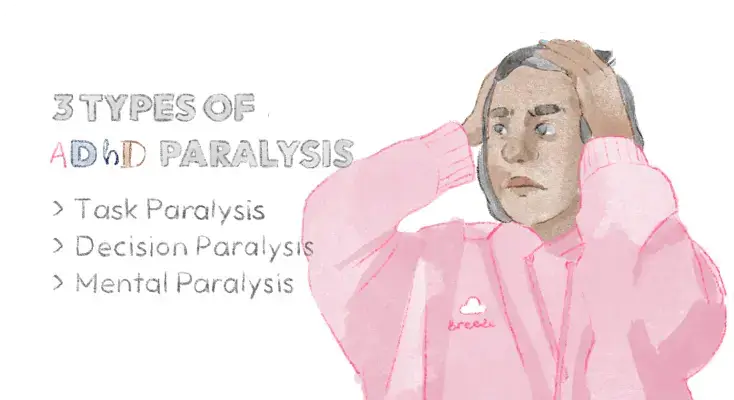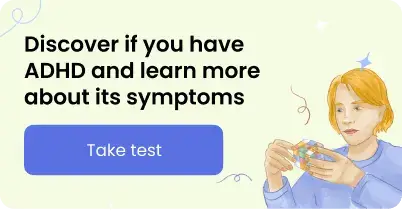Navigating the daily hurdles of life can be overwhelmingly daunting, especially for ADHDers. The persistent feelings of being overwhelmed and stuck—commonly referred to as “ADHD paralysis”—can stop your productivity.
If you’ve ever felt the weight of unfinished tasks and the frustration of unmet potential, you’re not alone. But there is a pathway to reclaiming your drive and focus.
TL;DR
- ADHD paralysis is an overwhelming feeling of being stuck. It’s when your brain feels like it’s locked in place, making it nearly impossible to start or complete tasks.
- This isn’t laziness. it’s a genuine struggle linked to how our brains process information and stimuli.
- ADHD impacts the brain’s executive functions, which are responsible for planning, organizing, and prioritizing tasks.
- By understanding the symptoms, identifying triggers, and implementing practical strategies, you can break free from the stuck zone.
ADHD paralysis test
These 8 insightful questions can help you figure out if what you’re experiencing is indeed ADHD paralysis.
Question 1: Do you feel overwhelmed by simple tasks?
Question 2: Is procrastination a frequent visitor?
Question 3: Are you struggling with time management?
Question 4: Do you often feel mentally exhausted?
Question 5: Is it hard for you to start tasks?
Question 6: Do you find even the slightest multitasking difficult?
Question 7: Do you experience decision fatigue?
Question 8: Is your workspace often cluttered?
If you have more than 4 “yes,” this article is for you. We’ll explore the core of ADHD paralysis, categorize its varying types, and furnish you with actionable techniques to conquer this challenge.
What is ADHD paralysis? Meaning and symptoms
You might be midway through writing an email, a client proposal, or even something as simple as a grocery list when – bam – the thought train is derailed. Suddenly, the lasso of paralysis has been flung over you.
ADHD paralysis is one of the hidden symptoms of the ADHD iceberg. It’s a state of cognitive and emotional gridlock.
Usually, you might feel unable (physically and emotionally) to do your duties, no matter how important they might be.
This, consequently, might cause stress, decreased self-esteem, and a growing list of responsibilities.
ADHD paralysis symptoms
ADHD paralysis signs often show up as a group of cognitive problems that impact planning, organizing, making decisions, managing time, and starting new tasks.
Adults with ADHD face unique challenges that compound these difficulties, including trouble with time management, organization, and motivation. Simple things like answering emails or finishing a document can become huge problems.
Symptoms of ADHD paralysis can include:
- Difficulty starting tasks
- Feeling overwhelmed by choices
- Anxiety about deadlines
- Frequent procrastination
It is not because they are stubborn or feeling unmotivated. The reason for this is due to brain function, overstimulation, and cognitive differences.
It’s important to understand that it isn’t enough to “just do it” or “stop being lazy.” A combination of genetic, environmental, and neurological factors can affect this state.
Anxiety, “I am a failure” feelings, and perfectionism can also play significant roles, creating a negative self-perpetuating cycle.
4 types of ADHD paralysis
Adults with ADHD can experience paralysis in a number of different ways. Some can switch between tasks without getting stuck in ADHD hyperfixation, which can make them forget about other obligations.
Some people have trouble making decisions because they have so many options for a task. Let us look at those examples of ADHD paralysis in more depth.
1. Task Paralysis in ADHD
Imagine standing at the threshold of a day filled with tasks, each one vying for your attention. You want to make a start, but an overwhelming sense of indecision descends. In the end, it leaves you stranded before you even take a step forward.
For people with ADHD, task paralysis happens all too often. In the face of multiple tasks, one can become so fixated on the perceived enormity of the duties ahead that the mere thought of beginning can cause cognitive overload. The result? Inaction.
2. Decision Paralysis
The grocery aisle is a great place for people with ADHD and decision paralysis to “fight” over things that most people just see as normal. Faced with an array of options, even a simple decision like selecting a cereal can trigger a flood of overthinking.
For ADHDers, every choice means devoting some of their limited mental resources to that option. In order to make the “right” choice, ADHDers can get stuck on the “what-ifs,” which makes it impossible to make a choice at all.
3. Mental Paralysis
Mental ADHD paralysis is the invisible foe of productivity. It’s the fog that descends on your mind, arresting your ability to think, plan, or complete even the simplest of tasks.
In the realm of ADHD, mental paralysis can take numerous forms, from the executive dysfunction that impedes one’s ability to start or sustain a task to the ADHD burnout that follows hyper-focused exertion.
4. ADHD Time Paralysis
Ever find yourself staring at the clock, knowing you have a million things to do but seemingly unable to start any of them? ADHD time paralysis feels like being stuck in a mental quicksand. You know you need to get moving, but you just can’t. It’s a frustrating experience that makes even the simplest task seem monumental.

Causes of ADHD paralysis
The cause of this paralysis is multifaceted. It’s rooted in the core symptoms of ADHD, which include inattention, hyperactivity, and impulsivity.
However, other psychological and environmental factors play a vital role in its development and persistence.
Multiple mental aspects that are typical of ADHD can lead to paralysis. These factors make it difficult for adults with ADHD to take action and manage their time effectively.
- Executive Function Deficits. People with ADHD might have issues with their executive functions, which are the mental skills that help us to do things. For example, they might have trouble keeping track of time, staying organized, and controlling their impulses. That is why it is hard to make plans and stick to them when these mental processes are working slower. This can cause paralysis.
- Emotional Dysregulation. Anxiety and depression are common in people with ADHD, study shows. It can make them even more vulnerable or sensitive to the stress of the tasks they need to do. Additionally, ADHD emotional dysregulation makes it harder to get things done because the person may feel too overwhelmed by feelings of not being good enough or fear of failing.
- Decision-Making Challenges. Making choices takes a lot of mental work, especially when there are a lot of options and a lot of different outcomes. Making decisions can become too much for people with ADHD, causing mental overload and, thus, not doing anything.
Environmental Triggers of ADHD paralysis
While underlying psychological factors contribute to paralysis, the environment also plays a critical role in triggering and reinforcing this symptom. Understanding these triggers is the first step in mitigating their impact.
- Overstimulation: People with ADHD may easily feel overwhelmed in today’s fast-paced and information-rich world. This ADHD overstimulation can “shut down” their ability to concentrate and make it nearly impossible to start or continue with a task.
- Lack of Structure. Consistency and structure are key to managing ADHD symptoms. Paralysis can get worse for adults who do not have a set schedule or clear instructions on what they need to do.
- Avoidance Behaviors. Most of the time, people think that putting things off is a choice or a character flaw. But for people with ADHD, it is an automatic way of dealing with the stress and uncertainty that tasks cause. This avoidance behavior can quickly snowball into paralysis.
ADHD paralysis vs. executive dysfunction
Sometimes, ADHD paralysis is described as “executive dysfunction,” but this term can also be used more generally to indicate difficulty with executive functions.
Executive functions are a set of mental skills that help you get things done. They include working memory, cognitive flexibility, and inhibitory control.
Although strategies that enhance executive functioning can also help with paralysis, it is more effective to target the specific factors that cause paralysis in ADHD people.
How does ADHD paralysis vs. depression?
Although ADHD paralysis and depression can look similar on the surface, they’re different beasts. Yes, both conditions are often misunderstood as laziness. However, understanding these differences can help you find the right strategies to manage each one.
- Emotional Experience: ADHD paralysis often comes with frustration and anxiety over not being able to start tasks, whereas depression carries a deeper, more persistent sense of hopelessness and sadness.
- Energy Levels: With ADHD paralysis, you might have bursts of energy but nowhere to direct it. In contrast, depression usually brings a constant feeling of fatigue and low energy.
- Motivation: People with ADHD paralysis want to complete their tasks but can’t seem to start, whereas those with depression often lose interest in the tasks altogether.
Are procrastination and ADHD paralysis the same?
While both procrastination and ADHD-induced paralysis might appear similar on the surface—characterized by delay and inaction—they stem from fundamentally different roots.
Procrastination is more often a voluntary delay of tasks. Of course, it is influenced by lack of motivation, fear of failure, or perfectionism, and is something nearly everyone can relate to on some level.
ADHD paralysis, however, is more complex and involuntary, arising from the neurological workings of the ADHD brain.
It can happen when someone is so stressed out about decisions, tasks, or feelings that they can not move. Sometimes, it has nothing to do with how hard the task seems or how well the person thinks they can do it.
How to get out of ADHD paralysis
Here are some tips on how to combat ADHD choice and task paralysis:
1. Time management
Conventional time management strategies don’t always work for those with ADHD. Instead, consider time blocking, a technique that dedicates specific blocks of time to focus work on single tasks. It will allow finding time for breaks and prevent paralysis and, ultimately, burnout.
2. Breaking down tasks
One of the most effective tactics for managing paralysis is task decomposition. Break your to-dos into bite-sized actions, and approach each one systematically. This not only makes daunting tasks more approachable but also provides a series of small wins to boost your confidence.
3. Tools for organization and focus
Leverage the power of technology to overcome the hurdles of ADHD. Use apps like Trello for visual task management or tools like the Pomodoro Technique to work in concentrated intervals with scheduled breaks.
4. Medication
In case you keep getting a shutdown response when you need to do important tasks or decisions, you might need to consider taking medicine.
According to studies, compared to neurotypical peers, ADHD brains can “use up” dopamine very quickly. So, some people may be prescribed antidepressants by healthcare professionals to reduce some ADHD symptoms and paralysis, too.
5. Follow your whims
It is common to feel pulled in different directions when you are trying to do one thing. Going with the flow and doing what you want to do is fine if you have time. Making and sticking to a list is not always more important than getting things you want to do.
6. Celebrate small wins
Recognize and celebrate small achievements. This positive reinforcement can boost morale and keep you motivated.
Mindfulness and self-care
Practicing mindfulness and meditation regularly may transform how you interact with the world. It also increases self-awareness and control. Along with self-care habits like working out and getting enough sleep, these can help lessen the emotional effects of ADHD paralysis.
Disclaimer
This article is for general informative and self-discovery purposes only. It should not replace expert guidance from professionals.
Any action you take in response to the information in this article, whether directly or indirectly, is solely your responsibility and is done at your own risk. Breeze content team and its mental health experts disclaim any liability, loss, or risk, personal, professional, or otherwise, which may result from the use and/or application of any content.
Always consult your doctor or other certified health practitioner with any medical questions or concerns
Breeze articles exclusively cite trusted sources, such as academic research institutions and medical associations, including research and studies from PubMed, ResearchGate, or similar databases. Examine our subject-matter editors and editorial process to see how we verify facts and maintain the accuracy, reliability, and trustworthiness of our material.
Was this article helpful?




